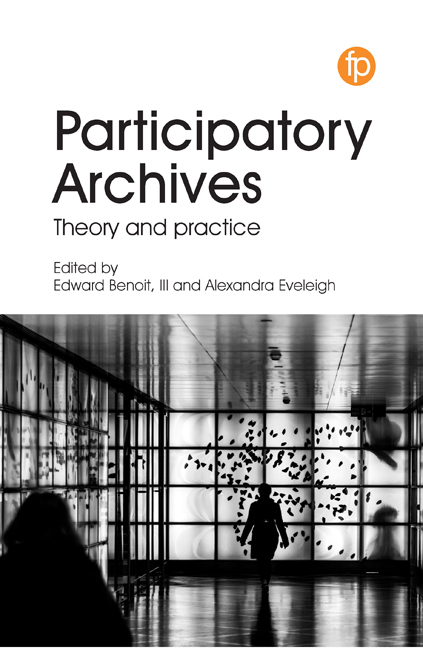Book contents
- Frontmatter
- Contents
- Figures and table
- Notes on contributors
- 1 Defining and framing participatory archives in archival science
- SECTION 1 SOCIAL TAGGING AND COMMENTING
- SECTION 2 TRANSCRIPTION
- SECTION 3 CROWDFUNDING AND OUTREACH
- 10 Kickstarting archives: crowdfunding and outreach in the digital age
- 11 Crowdfunding and the moral economies of community archival work
- 12 Acquiring equipment for obsolete media through crowdsourcing
- 13 Thinking outside the box: crowdfunding the Peter Mackay Archive
- SECTION 4 ALTERNATIVE AND ACTIVIST COMMUNITIES
- Notes
- Index
11 - Crowdfunding and the moral economies of community archival work
from SECTION 3 - CROWDFUNDING AND OUTREACH
Published online by Cambridge University Press: 25 October 2019
- Frontmatter
- Contents
- Figures and table
- Notes on contributors
- 1 Defining and framing participatory archives in archival science
- SECTION 1 SOCIAL TAGGING AND COMMENTING
- SECTION 2 TRANSCRIPTION
- SECTION 3 CROWDFUNDING AND OUTREACH
- 10 Kickstarting archives: crowdfunding and outreach in the digital age
- 11 Crowdfunding and the moral economies of community archival work
- 12 Acquiring equipment for obsolete media through crowdsourcing
- 13 Thinking outside the box: crowdfunding the Peter Mackay Archive
- SECTION 4 ALTERNATIVE AND ACTIVIST COMMUNITIES
- Notes
- Index
Summary
Introduction
Community efforts to collect, describe and preserve the living records of their own histories are not a new phenomenon. Myriad traditions for record and memory keeping are integral to the rhythms of human life and are expressed in various ways that may or may not be legible from within the eurocentric professional archival contexts in which many cultural institutions exist. Over the last few decades, professional archivists and archival educators have woven theories and practices of community archives into their practice in various ways while grassroots archival projects outside archival communities have continued, started and thrived. Theories of pluralising, radicalising, diversifying, breaking down and reinventing the archive have multiplied within and without the archival literature. These literatures have emerged predominantly in the UK and the USA, and while these two strains are steeped in their particular national contexts, both address the historical precedents and contemporary manifestation of independent community archives organised around geography, ethnicity, racial, religious, gender, sexuality, economic class and political orientation.
These literatures, while no means comprehensive, represent a fundamental shift in archival thinking away from unified theories of stewardship and neutrality to open up new ways of practising and collaborating as well as acknowledging limits to professional archival labour and expertise. The community archives movement has also precipitated questions around the value of archival labour, the homogeneity of the archival profession and the relative position of power inhabited by more well-funded cultural institutions. Through a growing cohort of community archivists, activist practitioners and educators, resources and frustrations have been shared. One issue, in particular, is maybe unsurprisingly persistent, that of sustainability. Yet a gap exists in the archival literature concerning economics and archives. Much of an archivist's working life is dealing with fundraising, budgets, workflows, insurance and legal contracts transferring ownership of property, and yet the literature is surprisingly limited on the relationship of these practices and attendant ideas of archival value or of institutional power. Community archival work that operates outside traditional structures requires a rethinking of funding models, labour practices and resource deployment that brings with it questions of political commitment and power.
This chapter seeks to situate crowdfunding not only as an emergent strategy for confronting the challenge of sustaining community archival endeavours but as a potential political-economic tool for community engagement precipitating vital questions regarding commitments to community ownership, community participation and independent control.
- Type
- Chapter
- Information
- Participatory Archives , pp. 131 - 142Publisher: FacetPrint publication year: 2019



